| Reviews & Columns |
|
Reviews DVD TV on DVD Blu-ray 4K UHD International DVDs In Theaters Reviews by Studio Video Games Features Collector Series DVDs Easter Egg Database Interviews DVD Talk Radio Feature Articles Columns Anime Talk DVD Savant Horror DVDs The M.O.D. Squad Art House HD Talk Silent DVD
|
DVD Talk Forum |
|
|
| Resources |
|
DVD Price Search Customer Service #'s RCE Info Links |
|
Columns
|
|
|
Battle for Marjah, The
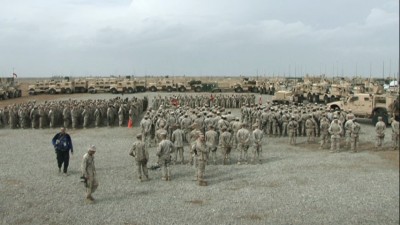
Please Note: The images used here are screen captures from the DVD edition, not the blu-ray.
In February 2010, Ben Anderson, an acclaimed telejournalist who has for years been covering the U.S. war on terror in Afghanistan, was embedded with a company of Marines who were part of a recently announced U.S. initiative to wrest control of the Southern Afghanistan town of Marjah from the Taliban. Anderson's documentation of this extremely dangerous, sometimes tragic mission was aired earlier this year on HBO Films as The Battle for Marjah, and it is a most timely and important piece of journalism, bringing us real, urgent news and showing us the things we badly need to see are happening, as we go about our business back home, in the wars being fought by our troops in our name. The mission that we witness Bravo Company carrying out is a very enlightening microcosm of the complexities and contradictions of the kind of war we're fighting in Afghanistan and other parts of the world; at the same time, however, Anderson never lets us forget that these Marines are individual human beings who, while loyally carrying out their orders, are hardly unthinking, uncritical robots who never think about the whys and wherefores of what they are engaged in.
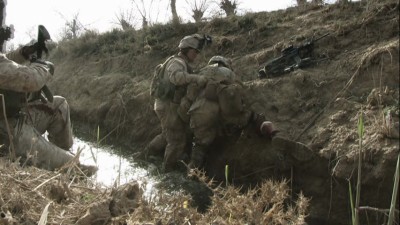
Anderson and director Anthony Wonke have structured The Battle for Marjah with an eye to leanness and clarity; intertitles and graphics introduce and explain what is going on as necessary, while the footage he has shot of the Marines painstakingly strategizing the mission, readying themselves for almost certain losses of life and limb, and finally implementing their plan gives us a sometimes uncomfortably vivid idea of what it is like to be shot at by snipers or barked at to rush ahead into what is likely to be deadly gunfire. The bulk of the film follows a four-day timeline, dictated by the amount of time it took the Marines to tentatively achieve their goal. That was, of course, longer than anticipated, and one of the many useful things we're reminded of by The Battle for Marjah is that, if it frustrates us in the civilian world that our leaders never seem able to predict glaringly obvious contingencies in these matters, how frustrating must it be if you are on the ground, in combat, as one easily foreseeable complication after another prolongs your duties and keeps you in harm's way?.
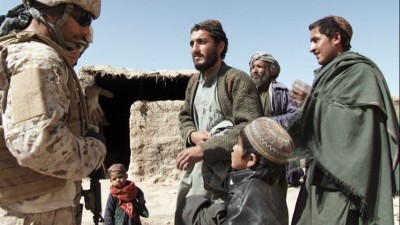
Over these four tense, deadly days, there is much combat; we see a soldier being severely wounded by enemy fire (we do not actually see any combat deaths, though there are a number of those, as well), and those of us who have never been shot at get a fresh appreciation of how traumatizing it can be. But it is the non-combat scenes, in which Marines are interviewed or we see them interacting with the Afghan civilians whose liberation they are ostensibly granting, that are most revelatory, moving, and disturbing. It is incumbent upon the Marines, for obvious political and moral reasons, to avoid at all costs harming women, children, and non-Taliban-affiliated civilians, which gives them a logistical encumbrance the enemy does not have to contend with. When an associated battalion does inadvertently destroy a building with civilians inside, killing four of them and injuring many more, it is not taken lightly, either by those directly responsible or by their commanders; when a group of Marines meets with the bereaved families of the innocent to apologize face to face and offer them a "condolence payment," it is incredibly moving and, at the same time, provocative, begging the question of who, ultimately, is responsible for the devastated consciences of the genuinely repentant Marines and the shattered lives of those villagers who have had members of their families killed.
Anderson also lets us in on the sometimes half-joking camaraderie and more frequent awkwardness--all mediated through an Arabic translator--between the Afghan civilians and the non-Arabic-speaking Marines; he also points up the dubiousness of the claim that Afghanistan is a "joint effort" with lots of local cooperation by showing us how condescending and rude the Marines are toward their not very well-trained, non-English-speaking Afghan-soldier counterparts (who are being represented to the American public via the media as a fully participating element, fighting alongside the American troops). But the real focus here is on the conundrum faced on a day-in, day-out basis by our troops in Afghanistan as they twist in the political wind, dutifully following orders based on decisions made in Washington. Anderson intercuts snippets of President Obama's speech about the Afghanistan strategy (met with applause from an assembly of top-brass West Point students, most of whom it seems unlikely will be in Afghanistan any time soon), and of high-ranking military officials as they spin what they are doing, and lets us decide, in the context of what we see happening on the ground in Afghanistan, whether or not the poses they are striking and the way they are selling the war to us matches what actually goes on in the painstaking, deadly process of fighting insurgents while trying to protect the innocent.
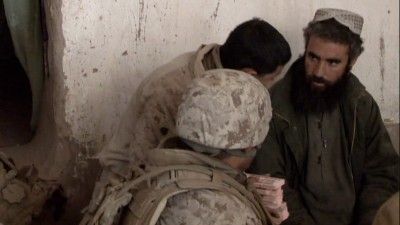
When they are in a large group or together in combat, the Marines display a level of machismo and bluster that comes off as obnoxious and even racist/jingoistic, but this is just the adrenaline-fueled bluff of the endangered moment; in less stressful moments and in one-on-one interviews, almost all of them are incredibly articulate, conscientious, sometimes doubtful, and emotionally very tuned in to what they are being required to do for their country. It is never, of course, a question of disobeying orders (which, again, reminds us that those following the orders might be considered less responsible, when things go wrong, than those who have given them). But perhaps the film's most salient moment comes when one of the Marines looks at the camera and says, while trying to hold back his tears at the thought of the innocent Afghan children whose lives he has unintentionally played a part in violently ending, that he does not know if it is always possible to separate the "duty" level of what he is doing in Afghanistan from the "political" level that has brought him there. When the film's coda tells us that the goal of self-rule and freedom from Taliban oppression in Marjah is, despite all the military and civilian blood spilled in the taking of the village, as far away as ever, if not farther, we may find ourselves not so certain about that distinction, either.
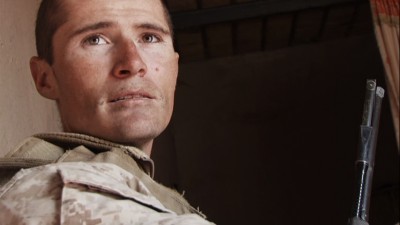
THE BLU-RAY:
The Battle for Marjah was shot in rough conditions with digital video, but it looks great; the logistics of getting this kind of footage could, perhaps, only be pulled off with the durability and low cost of DV, but in any case, the images are crisp and clear, with no video flaws I could detect. Its 1080i blu-ray transfer, combined with the sophisticated use of current video technology in the source material itself, does unfailing justice to the film's important goal of bringing the immediacy of its subject to us through our television screens.
Sound:Athena Learning, The Battle of Marjah's home-video distributor, presents it here with three soundtrack options: Dolby DTS Master Audio; Dolby Digital 5.1; and 2.0 stereo PCM. Each of these offers stunning sound that maximizes, to the fullest extent possible for each option, the film's surprisingly (for a documentary) wide-ranging, deep, complex audio (Andrew Phillips's atmospheric score sits at just the right low level to do its mood-setting job most effectively and unobtrusively). Roughly speaking, the DTS-MA (and, to a slightly lesser extent, the 5.1) soundtrack has a fuller, more "movie"-like sound, whereas the 2.0 stereo PCM provides a more concentrated, traditional "television"-like level of fullness and dispersion. But all three are excellent; it is simply a matter of preference, and it is to Athena's credit that they have given us such a wide range of choices.
Extras:As usual, Athena has not skimped when it comes to giving us background on the film. Though all the extras are text-based (there are no additional scenes, footage, etc.), they are as useful and relevant as any additional video would be. An on-screen timeline traces the war in Afghanistan from its inception immediately post-09/11 to the present and even beyond (NATO projects some advancement by 2014; this war is already the longest the U.S. has ever been involved in), and there are also on-screen text biographies of Anderson and celebrated war-chronicling photographer Goran Tomasevic. There is also an accessible, informative "viewer's guide" booklet insert that offers a detailed timeline of present-day Afghanistan's history (all the way back to 500 BCE) and 10 pages of in-depth information on the Marine Corps; the political, social, and cultural history of the region; the late-'70s U.S. support of and collaboration with the Taliban against the Soviet Union; and the history of that radical fundamentalist militia and Osama bin Laden's involvement in it. This release also includes a DVD copy of the film.
FINAL THOUGHTS:It would be difficult to come up with a more timely documentary than The Battle for Marjah, which gives us an up-close and sometimes jarring, sometimes moving human-level look at the day-to-day reality of our military presence in Afghanistan, the longest-running site of our war terror. In the sense of giving us necessary knowledge and vivid impressions, the film is most enlightening and insightful. But it is also very compelling and meaningful as an observation of the interpersonal, intercultural, and emotional elements of the situation it documents; innocent Afghan bystanders can only wait and hope that some good will come from their being caught in the middle of a deadly international crossfire, while the Marines dutifully struggle, with commitment, loyalty, and bravery, to carry what they are more than astute and thoughtful enough to realize is a less-than-flawless plan in aid of what may not even be the right or most effective military objectives. Both vitally relevant and put together with an adroit, engrossing skill that makes it positively riveting, The Battle for Marjah is essential viewing. Highly Recommended.
|
| Popular Reviews |
| Sponsored Links |
|
|
| Sponsored Links |
|
|
| Release List | Reviews | Shop | Newsletter | Forum | DVD Giveaways | Blu-Ray | Advertise |
|
Copyright 2024 DVDTalk.com All Rights Reserved. Legal Info, Privacy Policy, Terms of Use,
Manage Preferences,
Your Privacy Choices | |||||||













